Apple sellers, chemists and sugarcane cutters in Dharur taluka of Beed turn cricketers for two weeks a year as a jowar field is levelled into a cricket ground and teams outbid each other for top players to host a premier league that’s as thrilling as the real deal
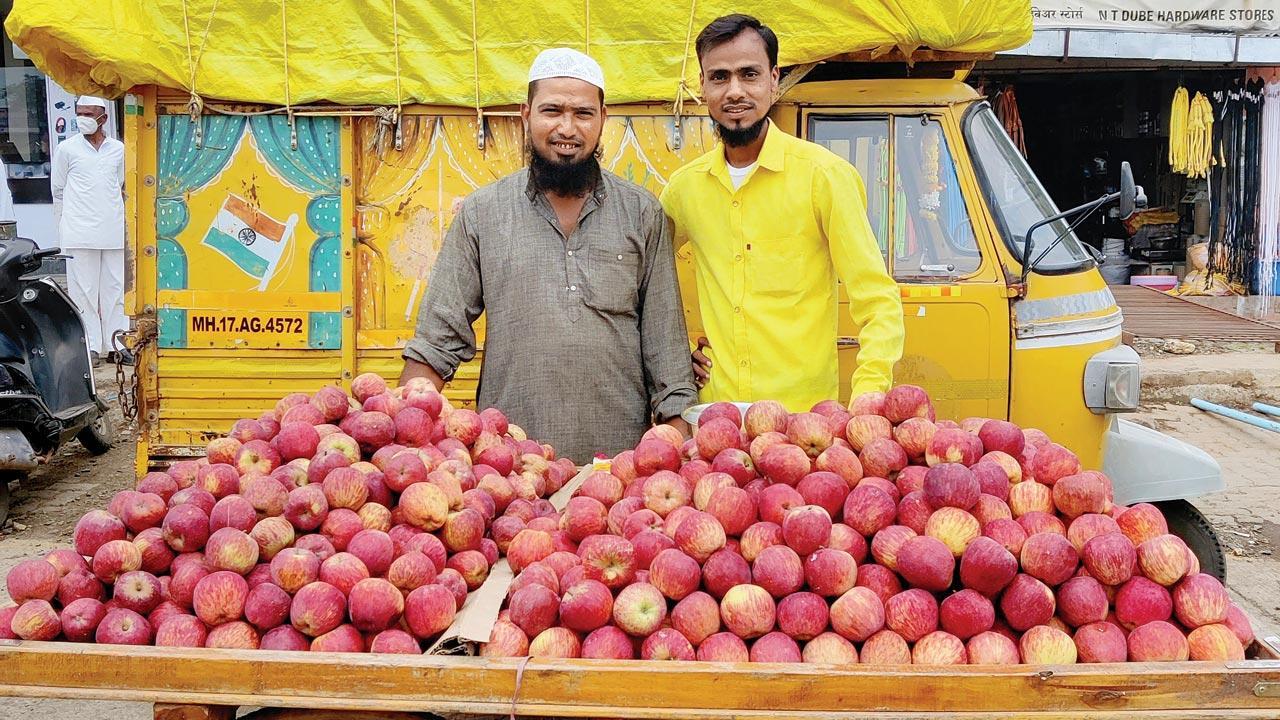
Childhood friends Abrar Tamboli and Azhar Kazi, who run an apple stall outside Dharur Bus Stop, co-own Bagwan Warriors, a franchise at DPL
For 11 months every year, Abrar Tamboli and Azhar Kazi work as apple sellers outside the Dharur bus depot in central Maharashtra’s Beed district. The childhood friends have been in the business for over a decade and are among the many street vendors who make a living in the bustling market area. But, for two weeks every year, the street sellers turn into local celebrities. Their photos are printed on posters and in local newspapers, and the market gears up in support. Tamboli and Kazi co-own a cricket team in the highly celebrated Dharur Premier League (DPL) tournament in the drought-affected town. Their 15-member franchise is named Bagwan Warriors.
ADVERTISEMENT
Established and run along the lines of the professional Twenty20 Indian Premier League, the DPL is an annual cricket championship that runs for two weeks in January. “We begin to practice only a few days before the tournament. It is very difficult to find time through the year,” says Kazi, 28, who began his DPL career as a right-arm bowler in 2013, when the league was first launched. He grew into a franchise co-owner in 2018. “The two weeks of the DPL are celebrated like a festival in our town.”
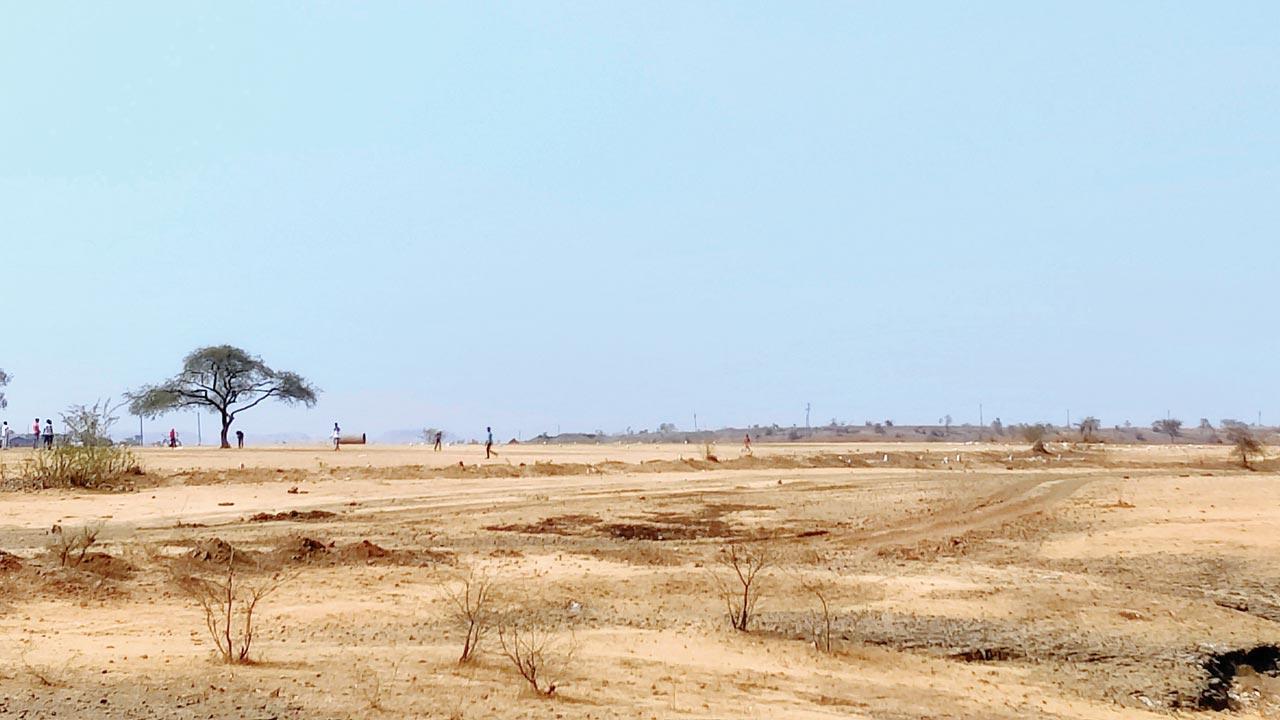 A five-acre jowar field is levelled into a cricket ground each year
A five-acre jowar field is levelled into a cricket ground each year
With player auctions, and orange and purple cap awards, the DPL is played on a former deserted jowar field levelled into a five-hectare cricket ground. Given the rugged quality of the pitch and the steep price of leather balls, it is played like a tennis ball cricket tournament; 10-over a side. “When the Indian Premier League was first launched, everyone was curious and invested,” says Virendra Chandrabhushan Awasthi, 49, co-founder of DPL. “While it was not possible for us to go to the IPL, we began to think if it would be possible to bring it to Dharur. Our boys were anyway playing in the fort, in the fields... everywhere actually.”
Awasthi, along with other members of the Jai Hind Cricket Club in Dharur began to develop their local edition in 2013. They set out on their motorbikes to scout for local talent in the nearby villages of the tehsil and published advertisements in regional newspapers to invite players for the auctions. “The response we received from the players and the public in the first round was beyond our expectations,” recounts Shaker Sayyad, a Dharur-based journalist, and DPL co-founder. In 2013, Dharur, much like the other parts of Marathwada, was still recovering from one of its worst droughts in 40 years. “Cricket has a way of bringing people together. It provides a temporary escape from everyday problems.”
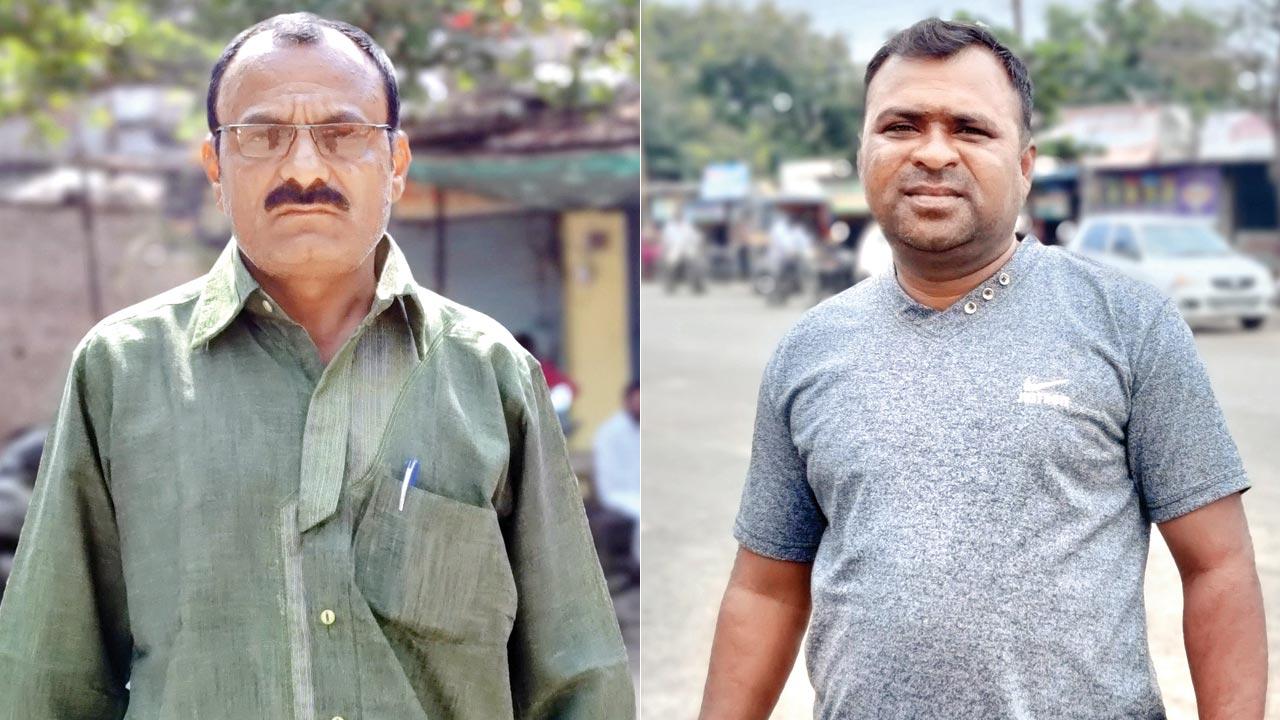 Co-founder of the DPL, Virendra Chandrabhushan Awasthi is locally known as Dharurcha Tendulkar. Awasthi couldn’t fulfill his aspirations to join the Indian cricket team in ‘80s. He now works as a cricket coach; (right) With only 10 overs, every ball counts and the on-field umpires like senior match umpire Babasaheb Gaisamudre, wield a lot of clout. Pics/Reetika Revathy Subramanian
Co-founder of the DPL, Virendra Chandrabhushan Awasthi is locally known as Dharurcha Tendulkar. Awasthi couldn’t fulfill his aspirations to join the Indian cricket team in ‘80s. He now works as a cricket coach; (right) With only 10 overs, every ball counts and the on-field umpires like senior match umpire Babasaheb Gaisamudre, wield a lot of clout. Pics/Reetika Revathy Subramanian
Even as the drama, suspense, and fanfare associated with player auctions in the parent league are recreated locally in the Dharur edition, the budgets and player deals remain fairly modest. The organisers had planned to invite either former Indian pace bowler Zaheer Khan or former U-19 cricket captain Vijay Zol, both players from Maharashtra, to inaugurate the league. But the plans were altered due to “budget issues”. More than 250 local boys and men, including farmers, sugarcane cutters, and students participate in the auctions, of which 120 are finally selected to make the eight franchises; the highest player can be bought for a maximum sum of Rs 3,000. The lowest bid is fixed at Rs 500 for the season. “We have had to cap the bid amount because increasing it could lead to fights on and off the field,” says Awasthi. “Some franchise owners are willing to shell out as much as Rs 40,000-Rs 50,000 for the top players. But that would take away from the spirit of the game.” The capped bid amounts have meant that top batsmen such as Arjun Mane, 28, get locked in an intense bidding war. “Every year, all the eight team owners shell out Rs 3,000 for me in the first round itself,” says Mane, a former sugarcane harvester, who won the orange cap (along with Rs 2,222 as prize money) in the 2020 season. “There is no room for further bidding or negotiation in that case.” The organisers then drew up a tried-and-tested solution to this problem that money couldn’t resolve. “We began to invite children to pick lots. It then depended on luck, and there were no fights,” says Awasthi. For Mane, however, luck wasn’t a part of the package he was offered in the 2021 season. He couldn’t score big because his “team was weak”. “You can play a long innings only if you are able to build strong partnerships,” he says.
With only 10 overs in total, every ball counts. And with no cameras and television replays to fall back on, the on-field umpires wield a lot of clout. “Unlike international cricket, we do not have third umpires for these matches,” says Babasaheb Gaisamudre, 40, a senior match umpire. “The umpires are all seasoned players themselves. Our decisions are usually right, 99.99 per cent of the time.” Gaisamudre has himself played in five finals, but his team has never won the championship. He has, however, been awarded the purple cap and Man of the Series title in the previous seasons.
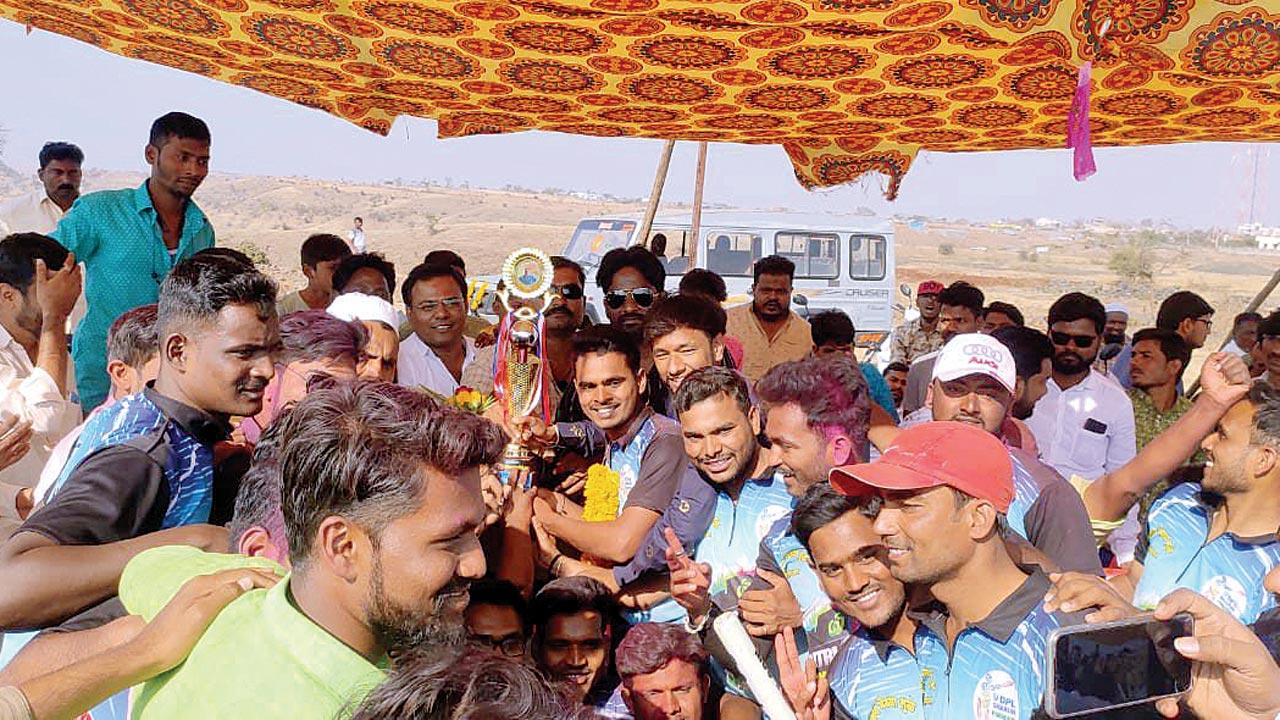 Members of the Maitri Cricket Club with their 2021 DPL trophy. Pic courtesy/DPL Organisers
Members of the Maitri Cricket Club with their 2021 DPL trophy. Pic courtesy/DPL Organisers
The 2021 edition of the DPL was held right in the middle of the COVID-19 pandemic. In January, there was a temporary drop in the number of positive cases reported in the region. “It had been a very tough year for all, and everyone was frustrated with being locked indoors,” says Awasthi. The organisers went ahead with the tournament inviting sponsors, franchise owners, and players. “People came for the matches in large numbers. During the finals, we had hundreds of fans and supporters seated atop jeeps and buses,” adds Awasthi. The organisers, however, weren’t lucky the second time around. The 2022 edition had to be cancelled due to the burgeoning Omicron cases reported in the state earlier this year. “We were really hoping that the case load across Beed would decrease by the end of January. Since it did not, we decided to cancel the tournament,” says Sheikh, “People were heartbroken, but it was wiser to stay safe and return with more energy next year.”
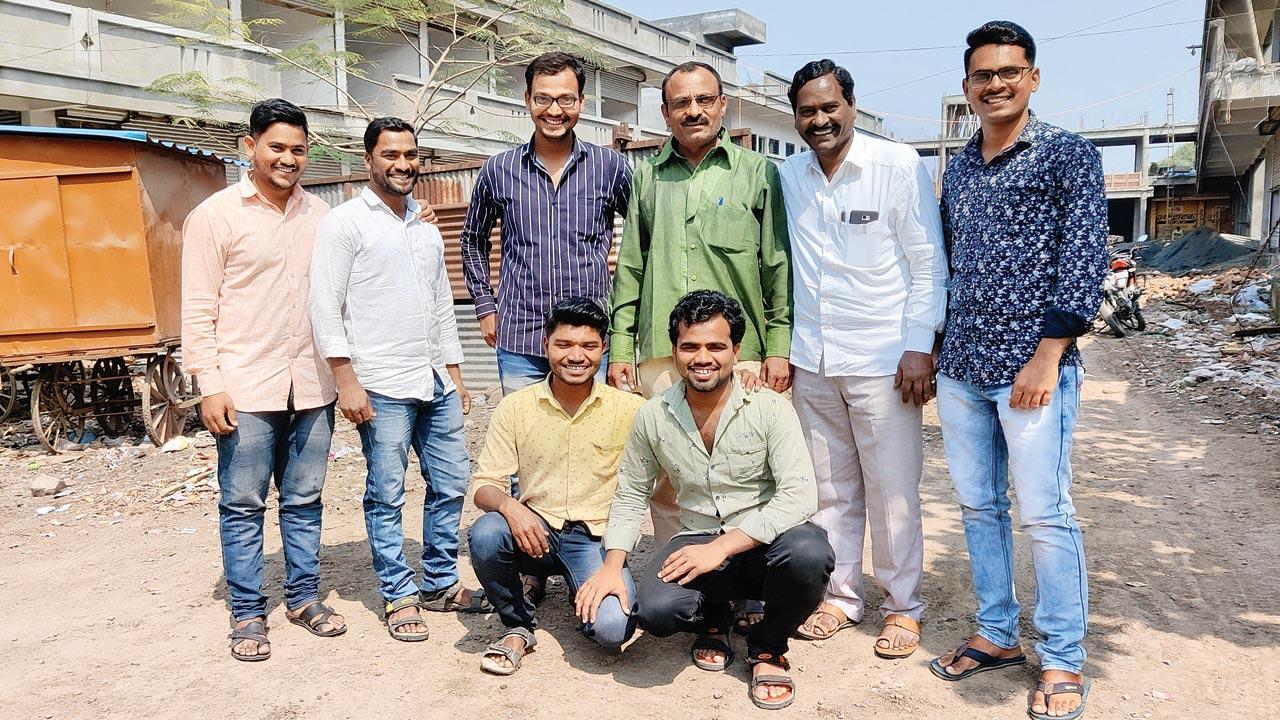 (From left) standing) Maitri Cricket Club player Sohail Sayyed, franchise co-owner Dnyaneshwar Bhagwan Tat, ace batsman and former sugarcane cutter Arjun Mane, co-founder, DPL Virendra Chandrabhushan Awasthi, team player Ashish Bhonsale, and journalist and DPL co-founder Shaker Sayyad. (From left, sitting) Maitri Cricket Club players Aniket Gaikwad, and Samadhan Kulkarni
(From left) standing) Maitri Cricket Club player Sohail Sayyed, franchise co-owner Dnyaneshwar Bhagwan Tat, ace batsman and former sugarcane cutter Arjun Mane, co-founder, DPL Virendra Chandrabhushan Awasthi, team player Ashish Bhonsale, and journalist and DPL co-founder Shaker Sayyad. (From left, sitting) Maitri Cricket Club players Aniket Gaikwad, and Samadhan Kulkarni
Back in 2021, the stakes were high for the top performers. Local shopkeepers, politicians, and organisations were roped in to sponsor the cricket bats, tennis balls, and wickets for the tournament, as well as the different high points of the game. This ranged from a princely sum of Rs 5,555 and a branded tracksuit for the Man of the Series; a smartphone for the Man of the Match; Rs 2,222 each for the winners of the orange cap (batsman with highest runs) and purple cap (bowler with maximum wickets); to Rs 51 for every wicket taken. The winning team was awarded a prize money of Rs 31,000. “We do invest a lot more than we can earn to run a franchise,” says 23-year-old Dnyaneshwar Bhagwan Tat, who co-founded Maitri Cricket Club along with his college friends from Beed. Comprising students, farmers, and a chemist as its key players, the Club won the 2021 finals. “It’s not the money. Our main focus is on good cricket and entertainment. We do get some fame as well.” The team bought a short holiday to Goa with its earnings.
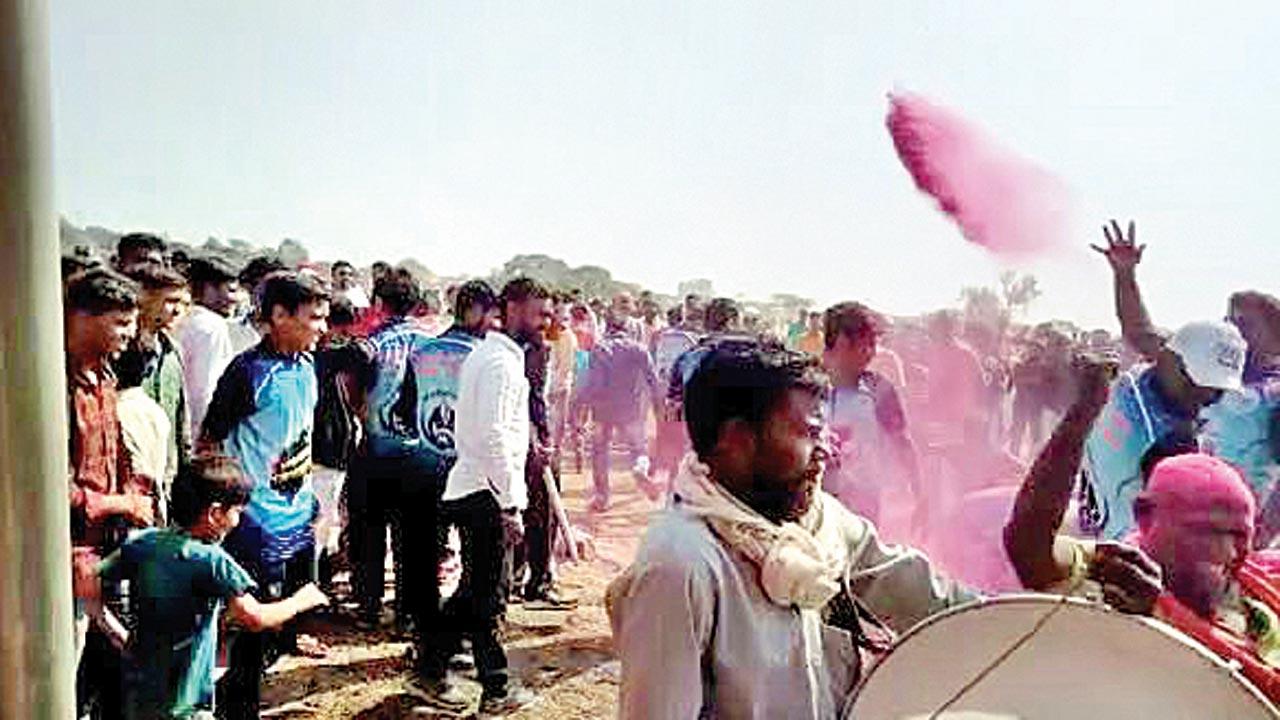 The organisers say the annual DPL is no less than a festival, with dhol, gulal and music to match
The organisers say the annual DPL is no less than a festival, with dhol, gulal and music to match
With several players in the Indian national team starting their journeys in Maharashtra, the senior cricketers of Dharur, too, harbour grand aspirations for the local youth. However, the cyclical droughts and the high out-migration rate have left them disappointed. “Nearly 80 per cent of the local population migrates every year for jobs. It’s a big loss for cricket,” says Sayyad, adding, “We are not able to find many players from the villages because they must work during the day and cannot come for practice. It is not even financially viable for them.” Awasthi also laments the lack of infrastructure in the town to back these pursuits. “Dharur is on a hilly terrain, which is why most lands are hard and dry. We do not have proper cricket pitches and facilities to train the boys.” Awasthi couldn’t fulfill his own aspirations to join the Indian cricket team in the late-1980s. In addition to co-founding DPL, he works as a cricket coach, and is locally known as “Dharurcha Tendulkar”. “Even today, we train the players using tennis balls. The leather balls are not only expensive, but also very dangerous to use in this terrain. These little things could affect a player’s aspirations in pursuing national or international cricket.”
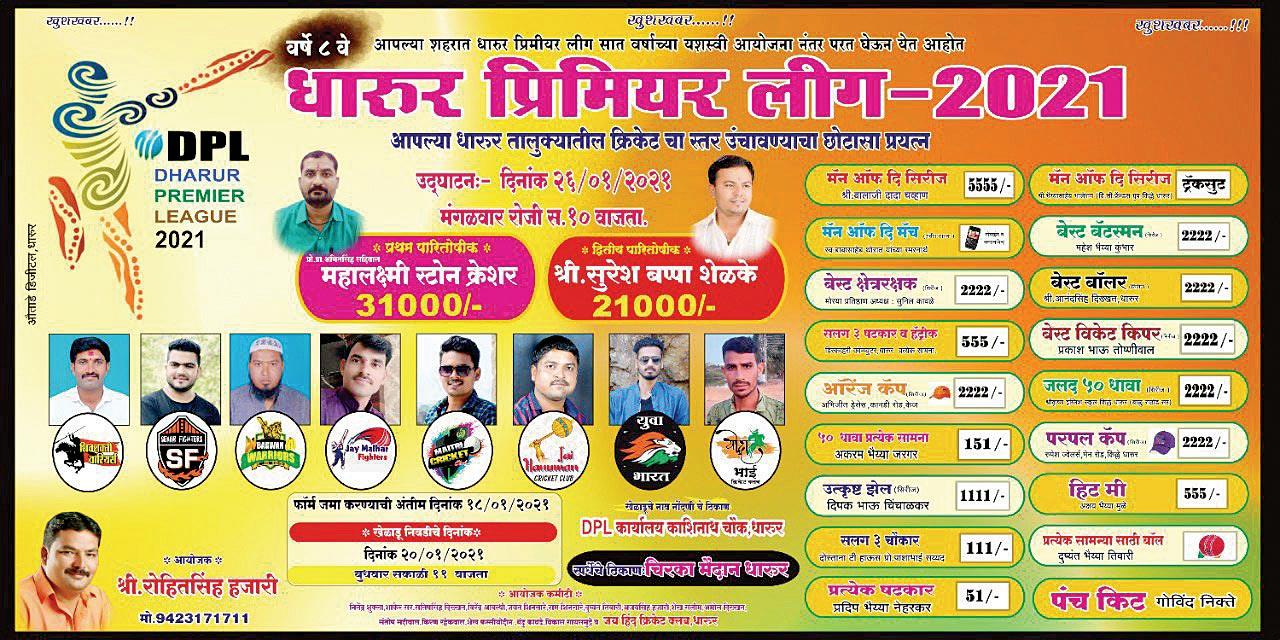 A poster announces the 8th edition of the DPL tournament. Pic courtesy/DPL Organisers
A poster announces the 8th edition of the DPL tournament. Pic courtesy/DPL Organisers
Further away stands the possibility of including women and girls in the all-male premier league. “Girls from Dharur are not allowed to play outdoor sports. In cities, there are sports academies. But here, we only have these open fields,” says Awasthi. “It will take a lot of time for families to send their daughters to join the DPL. I fear that we may not witness it in our lifetime.”
Rs 3,000
Max sum the most expensive player can be bought for
 Subscribe today by clicking the link and stay updated with the latest news!" Click here!
Subscribe today by clicking the link and stay updated with the latest news!" Click here!







